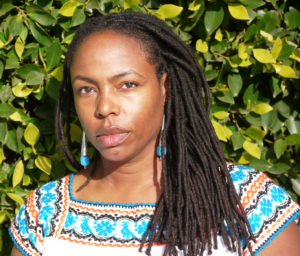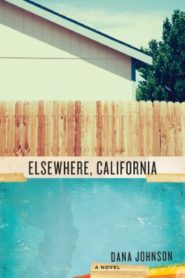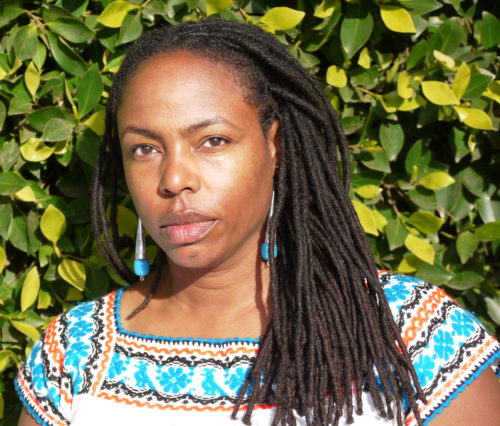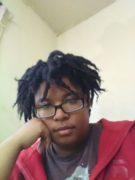Litdish: Dana Johnson, Author
 Dana Johnson is the writer of the short story collections Break Any Woman Down and In the Not Quite Dark, and the coming-of-age novel Elsewhere, California, which was nominated for the Hurston/Wright Legacy Award. She is an Associate Professor at the University of Southern California, and her work has appeared in The Iowa Review, Callaloo, and The Paris Review, among others. I sat down with Dana on August 23, 2017 in Downtown Los Angeles where we talked about her novel, identity and race, and teaching the craft of writing. The following is an excerpt from our conversation.
Dana Johnson is the writer of the short story collections Break Any Woman Down and In the Not Quite Dark, and the coming-of-age novel Elsewhere, California, which was nominated for the Hurston/Wright Legacy Award. She is an Associate Professor at the University of Southern California, and her work has appeared in The Iowa Review, Callaloo, and The Paris Review, among others. I sat down with Dana on August 23, 2017 in Downtown Los Angeles where we talked about her novel, identity and race, and teaching the craft of writing. The following is an excerpt from our conversation.
Lily Caraballo: I read Elsewhere, California for the interview. And I looked at your books, too, and I noticed the main character, Avery. You also did a couple of short stories focusing on her in Break Any Woman Down. My question is, what drew you to continue following Avery from short stories to a full-length novel?
Dana Johnson: Break Any Woman Down had Avery when she was little, like in fifth grade or something. That opened the collection and then the last story was Avery when she was much older, I guess mid-thirties or something. So we saw her when she was young and we saw her closer to middle age, and I… want to get in the middle, like connect the childhood to the adulthood and somehow… construct her story and talk more thoroughly or deeply about race in America, assimilation, class. There are all these issues that I wanted to get at that informed Avery’s identity, and so two short stories didn’t seem to be enough.
LC: I was reading, and I remember there were moments when I was getting angry for some reason because I didn’t like what I was seeing.
DJ: At Avery? Because some people were annoyed at her, too.
LC: It was more like… the change in the way she spoke, her dialect, and that angered me, and I didn’t know why, that was the weird thing. And as I was going on, I kept on thinking, “You know, I think I might have been in this situation too,” where I was told to speak properly.
DJ: Well, that’s what I wanted to discuss, because that’s assimilation in America. If you are a black person of a certain place and you move to another place that’s predominantly white, and you’re young, there’s inevitably some kind of… shift of you trying to blend in with the dominant culture.
LC: That also leads into another question. I felt like, especially later on in the novel, I noticed that, it just felt like… growing up, everyone—her friend and her neighbor—they’re telling her how to act, how to dress. And then around college, her father’s telling her that she needs to get a business degree… and there’s this pressure put on her to get the degree, and then when she got an arts degree, her family… didn’t feel that she actually succeeded. They looked at her, sort of like with blame or something. And it just came to me that, as a black woman, we get all these expectations put on us from everywhere. Do you feel that this is something black women face?
You have to figure out who you’re going to be, and I think when you have other layers like gender and race, in addition to all of that stuff, it becomes for some people even more complicated. Racially, what am I supposed to be, what’s authentically black?
DJ: Well, I think… it’s a struggle that everyone is going to have in their lives at some point, no matter male, woman, whatever race. You have to figure out who you’re going to be, and I think when you have other layers like gender and race, in addition to all of that stuff, it becomes for some people even more complicated. Racially, what am I supposed to be, what’s authentically black? As a woman, how am I supposed to be, am I supposed to be some sort of traditional person? What is my place, how do I identify as a woman with other women? There’s so many things.
LC: And it seems to pile up. The expectations, they do seem to pile up if you’re part of a marginalized community. If you’re a woman, you have the expectation to act like a proper woman, but if you’re gay or a person of color… it just starts adding up.
DJ: Absolutely, absolutely. And I think too—much like Avery, I come from a working class family and no one in my family ever did anything that was… traditionally artistic? I mean, I would argue that I’m sure there are many folks in my family who are artistic in other ways, but someone declaring that they wanna be a writer is just a weird thing. So…they’re proud of me now, but at the time there was this attitude of “Don’t you wanna make money?” [laughs].
LC: I’ve had that attitude with my dad’s side of the family. When I told them what I wanted to be, they’re like, “Okay, so what are you gonna do for money?” I always found that off-putting. But my mother’s side of the family, they’ve always been supportive of that fact… My mom, she encouraged both my brother and I to do the things we [liked]. She noticed I was good at drawing and writing, so she pushed that for me. My brother, he loved computer games and he was good with computers, so she pushed him towards that.
DJ: So she saw what your interests were and encouraged them.
LC: And… her parents weren’t like that. My uncle… he was good at drawing, too, and he brought it home to show it to my grandfather and he tore the picture up into pieces.
DJ: Oh my God.
LC: And my mom said that created this rift between her brothers and her father, because he wanted them to grow up… to what they’re not right now, if that makes any sense?
DJ: It’s funny because my dad’s side of the family, they’re these brilliant musicians and singers. I once asked my dad, “If you weren’t a social worker, what would you have wanted to be?” and he said he wanted to be a songwriter. So there’s all this creativity, nevertheless, in my family, but there was this unease, and… concern about actually pursuing something like writing very seriously.
LC: You mentioned that you and Avery share some similarities. Your experiences seem like a source of inspiration for the novel. Is that connected to why you came back to Avery as well?
 DJ: For a lot of writers, their first novels are bildungsromans, stories of coming of age… so, yeah, the stories and the novel were inspired by my experiences growing up. But both the novel and the stories are fiction, so there’s always emotional truths and perhaps situations that occurred, but I still had to construct a story that had an arc. And that’s what I had to do with Elsewhere, and I had fun with Elsewhere. I had several things that I was doing: I was changing Avery’s voice, and then the structure was one day in her life in contrast to her coming of age. So there’s one day in her life, but the rest of that’s interspersed with fifth grade, sixth grade, high school, whatever.
DJ: For a lot of writers, their first novels are bildungsromans, stories of coming of age… so, yeah, the stories and the novel were inspired by my experiences growing up. But both the novel and the stories are fiction, so there’s always emotional truths and perhaps situations that occurred, but I still had to construct a story that had an arc. And that’s what I had to do with Elsewhere, and I had fun with Elsewhere. I had several things that I was doing: I was changing Avery’s voice, and then the structure was one day in her life in contrast to her coming of age. So there’s one day in her life, but the rest of that’s interspersed with fifth grade, sixth grade, high school, whatever.
LC: The book seems to not only be about Avery navigating her identity, but also about California itself. The diversity in LA seems more complex than I thought it was when I moved here. Would you say that California is searching for its own identity?
DJ: I don’t think California is searching for its own identity; it has its own identity, and it’s complex, that’s what I would say. And that complexity never seems to be revealed or discussed or illustrated or documented in a way that completely satisfies the question of what is California… so that’s what I would say.
LC: One of the fears that I have, personally when I’m writing, [is that] I’m going to be expected to talk about race and how it affects me. And I feel that’s something we have to talk about, but I also don’t want to get pigeon-holed into that… do you ever get moments of that when you write?
…I just write what I want to write. But I do think ethnic writers that don’t necessarily write about their ethnicity or their blackness or whatever it is, do have a harder time getting recognition for what they’re writing, because writing about blackness if you’re black is what people want to see.
DJ: Oh, absolutely. There’s always this sort of expectation as an African-American woman writer that I’ll write about certain things. Sometimes I do and sometimes I don’t, I just write what I want to write. But I do think ethnic writers that don’t necessarily write about their ethnicity or their blackness or whatever it is, do have a harder time getting recognition for what they’re writing, because writing about blackness if you’re black is what people want to see. I just write what I want. My first short story collection is nine stories, a lot of them were about black folks but one was about this white punk rocker… I just wrote what I wanted to write. I wanted to write about humans. That’s what I did and that’s what I do.
LC: You’re a professor at USC. What do you hope that your students take away from your classes?
DJ: I really want my students to think about what is important to them. Why do they need to write? That’s the main thing. Lot of times, I get stories that are vague—someone goes to the movies, runs into Joe, and then other vagueness ensues… and I want them always to be thinking, “What’s at stake in your life, before you die, that you think is important to write about?” Think about that. Why are you even doing this? What stories do you need to tell? That’s the main thing that I’m hoping to teach them. And also basic craft stuff. People are always saying, “You can’t teach writing, you can’t teach someone how to be a writer.” You probably can’t, but you can teach them… craft things like anything else, in any other art form, or job or certain things one does, and if one does them well, you might turn into a good writer.
LC: What would you most like your writing to accomplish for your readers, and what would you like them to walk away with after experiencing your work?
DJ: I think it’s what every writer wants, which is the reader before reading what I wrote hadn’t thought about this particular thing either at all or in this other way. Just a kind of… opening of the mind, or at least providing questions, not even answers. My job isn’t to answer any questions, it’s just sometimes to cause the question to be formed while someone’s reading like, “What is that? What is she talking about? Why am I angry while reading this?” I just want people to be struck in some kind of way.


 Lily Caraballo is an MFA candidate in the Creative Writing Program at Antioch University Los Angeles. She works as a contributing writer for Black Girl Nerds and as a figure model for art classes in her spare time. Her work is expected to appear in the upcoming anthology My Body, My Words, which will be published next spring. She lives in Los Angeles.
Lily Caraballo is an MFA candidate in the Creative Writing Program at Antioch University Los Angeles. She works as a contributing writer for Black Girl Nerds and as a figure model for art classes in her spare time. Her work is expected to appear in the upcoming anthology My Body, My Words, which will be published next spring. She lives in Los Angeles.


